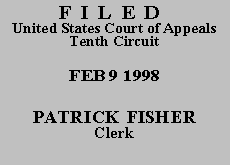 UNITED STATES COURT OF APPEALS
UNITED STATES COURT OF APPEALS
 UNITED STATES COURT OF APPEALS
UNITED STATES COURT OF APPEALS
TENTH CIRCUIT
Plaintiff-Appellee,
v.
RAUL MIRAMONTES-LAMAS,
Defendant-Appellant. (D.C. 97-CR-164-C)
(District of Utah) ORDER AND JUDGMENT(*)
In 1994, Mr. Miramontes-Lamas was convicted in Utah state court of possession
of heroin. See Rec. vol. II, at 6. This conviction marked Mr. Miramontes-Lamas's third
conviction under Utah law for possession of a controlled substance. See id. at
3-6. And
under Utah law, if an individual has two prior convictions for possession of a controlled
substance, a third possession conviction constitutes "a third degree felony." Utah Code
Ann. § 58-37-8(2)(e),
In this appeal, Mr. Miramontes-Lamas contends that the district court
misconstrued the meaning of "aggravated felony" under 8 U.S.C. § 1326(b)(2) and, thus,
incorrectly ruled that his prior Utah conviction for possession of heroin warranted a 16-level
enhancement to his current federal sentence for illegally reentering the country. We
review de novo a district court's interpretation of a criminal statute. United States v.
Valenzuela-Escalante, 130 F.3d 944, 945 (10th Cir. 1997).
Under 8 U.S.C. § 1101(a)(43)(B), a prior conviction constitutes an "aggravated
felony" for sentencing purposes if it qualifies as "a drug trafficking crime (as defined in
section 924(c) of Title 18)." 18 U.S.C. § 924(c) explains that "drug trafficking crime"
means, in relevant part, "any felony punishable under the Controlled Substances Act (21
U.S.C. 801 et seq.)." Mr. Miramontes-Lamas's conviction meets both prongs of § 924(c),
since (1) it is a felony under Utah law, see Utah Code Ann. § 58-37-8(2)(e)(1); and (2) it
could have been punished under the Controlled Substances Act, see 21 U.S.C. §
844(a).
See also United States v. Cabrera-Sosa, 81 F.3d 998, 1000 (10th Cir.), cert.
denied, 117 S.
Ct. 218 (1996).
Prior to 1994, 8 U.S.C. § 1101(a)(43) defined an "aggravated felony," in relevant
part, as "illicit trafficking in a controlled substance . . . , including a drug trafficking crime
(as defined in section 924(c)(2) of Title 18)" (emphasis supplied). In 1994, Congress
amended the definition of "aggravated felony" so as to include "drug trafficking
crime[s](as defined by "section 924(c) of Title 18)" (emphasis supplied). Section 924(c)
covers not only drug trafficking crimes, see § 924(c)(2), but also crimes of
violence, see
§§ 924(c)(1), (3).
The crux of Mr. Miramontes-Lamas's argument is that, when Congress amended
the definition of "aggravated felony," it intended to exclude all drug crimes that did not
involve possession of a firearm. However, we recently rejected this identical argument in
Valenzuela-Escalante, 130 F.3d at 947. Today, we follow
Valenzuela-Escalante and once
again rule that, by amending the definition of "aggravated felony," Congress intended to
expand rather than restrict the number of crimes that qualify as aggravated felonies
under
Chapter 8 of the United States Code. See id. Accordingly, we hold that Mr.
Miramontes-Lamas's conviction for heroin possession constituted an aggravated felony under 8
U.S.C.
§ 1326(b)(2) despite the fact that this conviction did not involve possession of a firearm.
Citing only Webster's Dictionary as authority, Mr. Miramontes-Lamas also
contends that mere possession of narcotics cannot qualify as "drug trafficking," because
"trafficking" necessarily involves some element of trade or exchange. Unfortunately for
Mr. Miramontes-Lamas, Webster's Dictionary is not controlling authority in this circuit.
However, Valenzuela-Escalante is, and in that case we held that possession of a
controlled substance alone, even if not for the purpose of distribution or sale, is sufficient
to qualify as "drug trafficking" under 18 U.S.C. § 924(c), thus triggering the aggravated
felony enhancement under 8 U.S.C. § 1326(b)(2). See 130 F.3d at 945-47.
Thus, we conclude that Mr. Miramontes-Lamas's prior conviction for possession
of heroin constituted an "aggravated felony" under 8 U.S.C. § 1326(b)(2), and we
AFFIRM his sentence.
The mandate shall issue forthwith.
Entered for the Court,
Robert H. Henry
Circuit Judge
*. After examining the briefs and appellate
record, this panel has determined
unanimously to grant the parties' request for a decision on the briefs without oral
argument. The case is therefore submitted without oral argument. This order and
judgment is not binding precedent, except under the doctrines of law of the case, res
judicata, and collateral estoppel. The court generally disfavors the citation of orders and
judgments; nevertheless, an order and judgment may be cited under the terms and
conditions of 10th Cir. R. 36.3.
1.The Controlled Substance Act defines
"felony" as "any Federal or State offense
classified by applicable Federal or State law as a felony." 21 U.S.C. § 802(13).
UNITED STATES OF AMERICA,
No. 97-4130
Click footnote number to return to corresponding location in the text.
![]() | Keyword |
Case |
Docket |
Date: Filed /
Added |
| Keyword |
Case |
Docket |
Date: Filed /
Added |
![]() (15089 bytes)
(15089 bytes)
![]() (10414 bytes)
(10414 bytes)
Comments to: WebMaster,
ca10 [at] washburnlaw.edu.
Updated: February 10, 1998.
HTML markup © 1998, Washburn University School of Law.
URL: http://ca10.washburnlaw.edu/cases/1998/02/97-4130.htm.